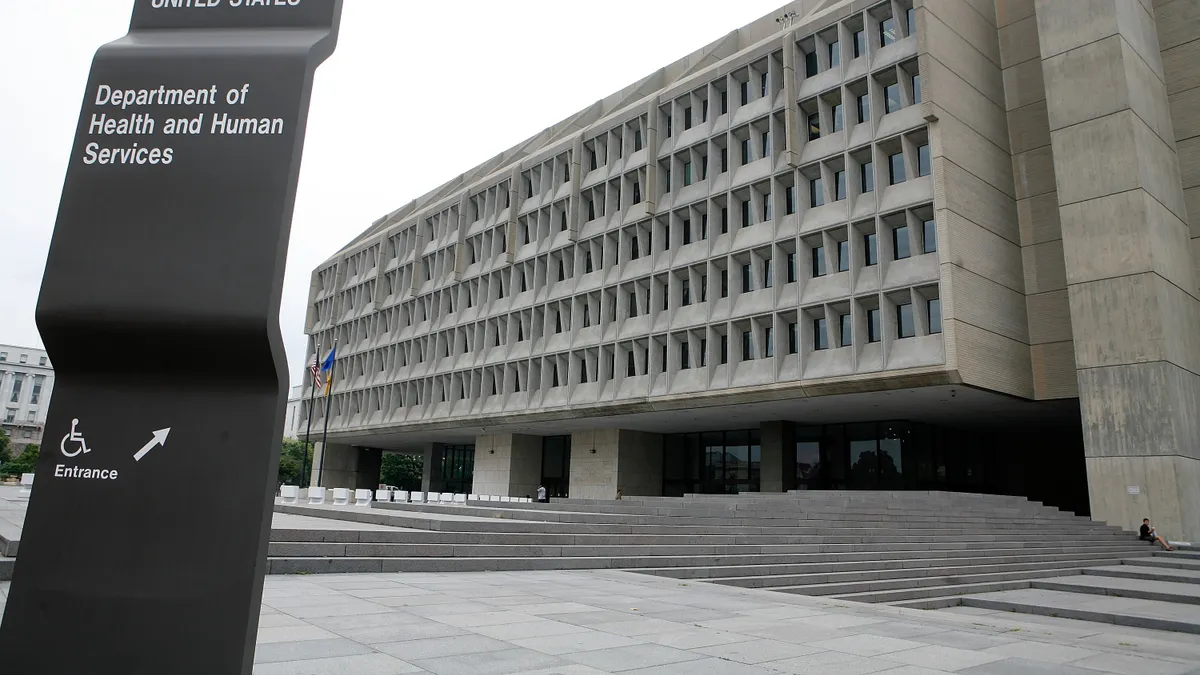Dive Brief:
- HHS is withdrawing a Trump administration policy that directed FDA not to require premarket review for laboratory developed tests, a category that expanded rapidly during early efforts to combat the spread of the coronavirus, the agency said Monday.
- LDTs are diagnostic tests designed, manufactured and used within a single laboratory. New COVID-19 tests, including LDTs, will now require an emergency use or traditional marketing authorization, FDA said separately. The shift in regulatory approach is intended to increase the accuracy and reliability of coronavirus tests and to increase access to at-home diagnostics. The agency also reissued a guidance addressing the subject.
- The American Clinical Laboratory Association, which represents labs including Labcorp and Quest, said it appreciates the Biden administration's focus on ensuring high-quality testing but warned "continually shifting regulatory policies creates uncertainty and undermines patient access to lifesaving diagnostics."
Dive Insight:
The August 2020 policy that exempted LDTs from premarket review surprised the industry and drew criticism from legislators as well as former FDA Commissioner Scott Gottlieb, who warned the reversal of public health precedent could compromise the agency's ability to provide critical advice to test developers and take enforcement action against bad tests.
A senior AdvaMed official at the time said the Trump administration's move was the "the wrong call," expressing concern that developers would be subject to varying standards for testing validation.
HHS is now saying the policy of allowing test developers to forgo the premarket review process, including premarket approval, 510(k) clearance and emergency use authorization, has limited FDA's ability to address some problematic COVID-19 tests. HHS Secretary Xavier Becerra said that from this point forward, the agency no longer has a policy on LDTs that is separate from FDA's longstanding approach in this area. "By withdrawing the policy, HHS is helping to ensure that COVID-19 tests work as intended," Becerra said in a statement.
FDA made the case that the prior policy allowed developers to offer their tests before or without an EUA, after the test was validated and a notification was provided to the FDA. The policy was intended to expedite the availability of tests but led to some poorly performing tests being offered prior to FDA review, according to the agency, which noted that the policy never applied to at-home or home collection tests.
The agency said it is ending the notification practice going forward. For tests currently being offered without the submission of an EUA request, FDA now expects one to be submitted. For tests with pending EUA requests, the agency said it would review the submission, and if the test is not subsequently authorized, expects developers to cease marketing the test within 15 calendar days of being notified.
FDA also issued an umbrella EUA for serial testing with certain molecular diagnostic tests developed by laboratories. These diagnostics can be used for testing at regular intervals as part of programs such as those established at schools, workplaces or community groups.
The agency said it generally intends to focus its review on EUA requests for at-home and point-of-care diagnostic tests that can be manufactured in high volumes; lab-based molecular diagnostic tests that expand testing capacity or accessibility; high-volume antibody tests; and tests for which the request is supported by a U.S. government stakeholder, such as the Biomedical Advanced Research and Development Authority or the National Institutes of Health’s Rapid Acceleration of Diagnostics.
The ACLA, in its response to the testing policy shift, said the decision underscores the need for "comprehensive diagnostic reform legislation that can provide long-term clarity and continuity for clinical labs." LDTs fill gaps in medical care for which a test may not currently exist, such as for cancers and rare diseases, the group noted.
Congress has considered differing bills for regulating LDTs. The author of a recent Massachusetts General Hospital study of the government's response to the pandemic backed putting responsibility for oversight of high-risk LDTs in FDA's hands.
Jochen Lennerz, medical director of the MGH Center for Integrated Diagnostics, voiced his support for the Verifying Accurate, Leading-edge IVCT Development (VALID) Act which would create a risk-based regulatory framework specific to diagnostics and a new test product category that includes lab developed tests.
The Pew Charitable Trusts has also studied LDTs, finding last month that federal oversight has lagged as lab developed tests grow increasingly complicated, while noting that lab managers generally prefer using diagnostics that have undergone FDA review.
Pew called the VALID Act, which would direct the agency to regulate all diagnostics "based on their risk to patients if tests give the wrong result, rather than on where they are created and used," the most recent and comprehensive proposal to date seeking to modernize IVD regulation.










